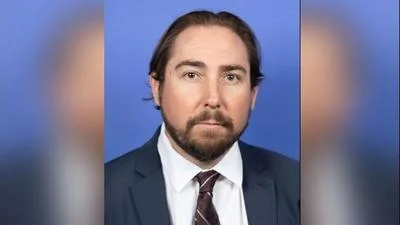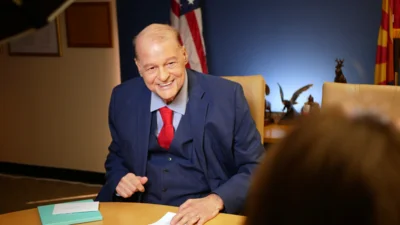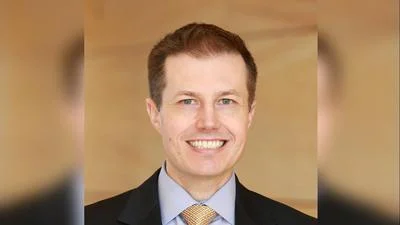Agpac of the Arizona Farm Bureau Federation issued the following announcement on April 9
Julie Funk, PhD, Dean of the College of Veterinary Medicine for UArizona, spoke with Arizona Farm Bureau recently to explain the program and highlight the unique features of this new vet program at the University.
For every student dreaming of a career in veterinary medicine, Dr. Funk’s insights here should not only inspire consideration but motivate you to jump in firmly with both feet.
Arizona Agriculture : The Vet School is a historically significant moment. UArizona College of Agriculture and Life Sciences Dean Burgess noted that The Arizona Board of Regents made UArizona’s Agriculture and Life Sciences a college on July 1, 1889 and the College of Veterinary Medicine in 2019. 130 years apart! Speak to this.
Funk : The College of Veterinary Medicine is the culmination of years of planning on the part of many individuals and organizations that have worked tirelessly to bring this vision to life.
As a land grant university, the University of Arizona has a rich historical connection with agriculture. This program is built on the foundation of relationships with our communities, partnering veterinarians and the people of the state who have invested in us. It is a natural outgrowth of the strong agricultural and health sciences programs offered at the University of Arizona, as well as a natural extension of our proud heritage with the state.
Arizona Agriculture : A kind of mission statement on the home page of UArizona’s College of Veterinary Medicine says, “Globally Inspired. Authentically Arizona. Unlimited options.” What’s your interpretation of this statement?
Funk : Our program is unlike any other. Our primary mission is to lead the profession as a student-centered program focused on developing career-ready veterinarians who will live healthy meaningful lives and serve society. Being student-centered means that every part of our planning, from our curriculum to faculty hiring, is designed to ensure that students begin learning from animals their first week in the program. We will have cutting-edge, active learning that won’t require a lecture format and will provide students the opportunities to become innovative, adaptive learners and disruptive problem solvers. Additionally, students will graduate sooner and begin earning a salary as soon as possible with minimal debt.
Students will also learn from Arizona practitioners and be in practice throughout their program as we partner with veterinarians in a myriad of practice types, for example, rural mixed animal practice, companion animal general practice, specialty practices, zoos, shelters, and industries that employ veterinarians
In addition to strong foundational knowledge in veterinary medicine and surgery, UA DVM students will be taught both professional and personal skills necessary for future success. Mandatory classes in financial management, managing stress and functional life skills will be integrated throughout the three-year program.
Arizona Agriculture : Two key elements that make UArizona’s Vet program unique is cost and timeframe. What drove this motivation to reduce the cost of vet school and to fast track it?
Funk : There has been a growing discussion around the need to help future veterinarians create a sustainable lifestyle and to give them the resources it takes to thrive in rural areas where there may be a lack of resources and support. Many of these issues correlate to the burden of rising student debt. While investing in a future career is important, choosing a DVM program is still a significant decision for students and their families because their earning power is not the same as medical physicians. In addition to our tuition rates, our three-year curriculum plan will allow students to start their career and begin earning a salary a year earlier than other graduates.
Arizona Agriculture : We talk a lot about the benefits of the UArizona’s own vet program including keeping Arizonans who graduate from the College of Veterinary Medicine in Arizona to practice animal health. But, what other additional benefits can the state of Arizona expect with this program?
Funk : In addition to our innovative team-based teaching style, we will be partnering with veterinarians throughout Arizona and beyond for our clinical rotation years in order to provide students with more hands-on real-world experience. The use of real-world practice settings for our third-year rotations will encourage growth and partnership with Arizona businesses and help students develop deeper relationships with the people they serve. Students who learn in Arizona will stay in Arizona. Highly trained veterinarians staying in Arizona means the advancement of health and productivity of agricultural animals, improvements in safety of our food supply and more access to doctors who care for our family pets. Good veterinarians are often the most beloved and needed medical practitioners in a community, and there is a direct correlation between our quality of life and our human/animal bond.
Arizona Agriculture : From your perspective, what excites you the most about the program and why?
Funk : It is the opportunity of a lifetime! To be able to part of starting a new College of Veterinary Medicine at a top tier, public, research-intensive, land grant university is an unbelievable opportunity that I am grateful for every day. I love helping people grow. Seeing our students, faculty and staff collaborate to learn and innovate is very rewarding. All of this leads to increasing our ability as a profession to serve people through animal health.
Arizona Agriculture : From an Arizona agriculture perspective, what can you tell our farmers and ranchers to expect from this program in the next 5 to 10 years?
Funk : Comprehensive animal health and food supply safety relies on having access to qualified veterinary care, and no one understands this better than farmers and ranchers. The Arizona agricultural family has supported the creation of this college at every step, and we hope that they will see an immediate return on their investments as soon as we graduate our first class in 2023.
We look forward to continuing the strong relationship with farmers and ranchers throughout the state. This is critical to the success of the CVM, as we need to be certain we understand the needs of the community so that our graduates will be ready to serve their communities.
Arizona Agriculture : There are still challenges ahead with the program, what are the big ones and how as dean will you tackle them?
Funk : Our primary goal is to ensure that we maintain a positive working environment for our staff and faculty and stay very focused on innovation, balance and a student-centered veterinary medicine program. All this, while building deep connections to our local veterinary practices and the communities we serve.
Arizona Agriculture : What would you ask of our animal agriculture producers to really lift this program and give it momentum?
Funk : Veterinarians play a significant role in our society, and having more individuals pursuing this career track translates to multiple benefits for Arizona. From general animal health and well-being to making sure the food you eat is safe and that you can trust what you are putting on your table to feed your family every night, veterinarians are integral in the ongoing partnership between the health community and animal producers.
Support from the agricultural community is vital with respect to employing our graduates, informing our faculty about the specific needs of producers and providing student access to their farms and animals will remain a core part of our success.
Arizona Agriculture : What other specifics to this program would you like to share?
Funk : We are excited to share that we recently received approval from the American Veterinary Medical Association to open the state's first public College of Veterinary Medicine.
The Letter of Reasonable Assurance, granted by the AVMA Council on Education is the first step toward full accreditation by the AVMA COE, which will continue to monitor us until our first cohort graduates in 2023. During the provisional accreditation period, graduates of our program will be fully eligible to sit for licensure to practice veterinary medicine.
Our program is ultimately about passion and service, and we encourage those interested in applying to our program find more information on our website vetmed.arizona.edu or contact us via email at vetmed@arizona.edu.
Editor's Note: This article first appeared in the March 2020 issue of Arizona Agriculture
Original source can be found here.
Source: Agpac of the Arizona Farm Bureau Federation






 Alerts Sign-up
Alerts Sign-up